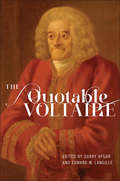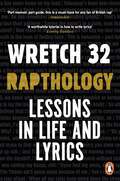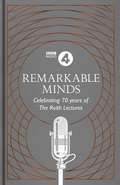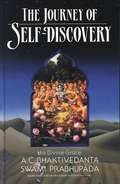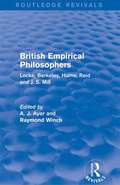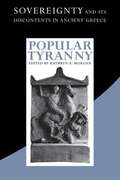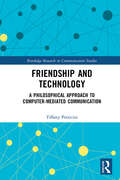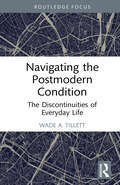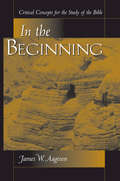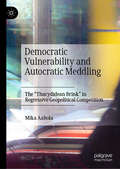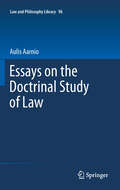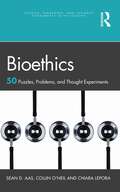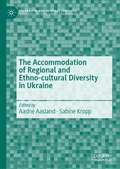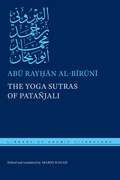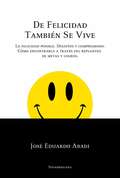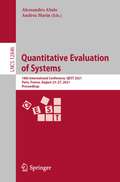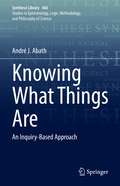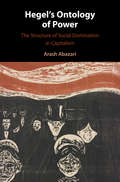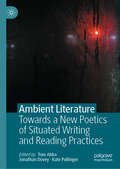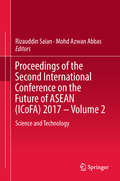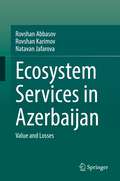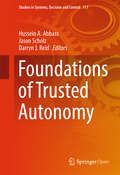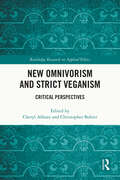- Table View
- List View
The Quotable Voltaire
by François-Marie Arouet (1694-1778)The author of more than 2,000 books and pamphlets, Voltaire (François-Marie Arouet, 1694-1778) was one of the most prolific writers of the eighteenth century, and also one of the wittiest and most insightful. This unique collection of over 800 of Voltaire’s wisest passages and choicest bons mots runs the gamut on topics from adultery to Zoroaster, in both English and French. Drawing from a wide range of his publications, private letters, and remarks recorded by his contemporaries, The Quotable Voltaire includes material never before gathered in a single volume. English translations appear alongside the original French, and each quote is thoroughly indexed and referenced, with page numbers for both the first known publication edition of each entry and the most recent edition of Voltaire’s works. The book also features over 400 quotes about Voltaire, including commentary by eighteenth-century luminaries like Samuel Johnson, Catherine the Great, Casanova, and John Adams, as well as an eclectic assortment of modern-day personages ranging from Winston Churchill and Jorge Luis Borges to Mae West and Mike Tyson. Lavishly illustrated with nearly three dozen images of Voltaire-related art, this collection opens with a scholarly essay that recounts the great man’s life and reflects on his outsized influence on Western culture. Whether you are a Voltaire scholar or a neophyte, The Quotable Voltaire is the perfect introduction to a brilliant mind.
Rapthology: Lessons in Life and Lyrics
by Jermaine Scott 32'Groundbreaking... Part memoir, part guide, this is a must-have.' Independent'A worthwhile tutorial.' Evening Standard"Poetry and rap come from the same family. They're brothers. Just because you're good at one doesn't necessarily mean you'll be good at the other, but if you master both you'll be unparalleled."Rapthology is a masterclass in lyric writing. A spotlight into the craft and skill of what it takes to be an incredible artist by pioneering musician and artist, Wretch 32. Taking us through the songs which have shaped his career over the last two decades step by step, explaining what each song means to him, his own creative process, from the first flashes of inspiration to final edits and improvisation, right through to how popular and powerful his lyrics are.Part autobiography, part guide to creativity and part cultural history Rapthology is a blueprint to the music that matters.
Remarkable Minds: A Celebration of the Reith Lectures
by BBC Radio 4IDEAS THAT HAVE THE POWER TO CHANGE THE WORLDThe best of an extraordinary 70 year archive, gathered in one volume for the first time. The prestigious BBC Reith Lectures have been enriching the world with new ideas since 1948. Every year, a world-leading thinker is invited to speak on a topic of their choosing, spanning art, science, nature, technology, history, religion, society, culture, politics and much more. Unearthing forgotten gems as well as sharing the latest in intellectual thought, Remarkable Minds is a time capsule into our changing world that provides wise words for turbulent times. With a foreword by Anita Anand, presenter of the Reith Lectures, and an introduction by Gwyneth Williams, controller of Radio 4, 2010-2019.
Remarkable Minds: A Celebration of the Reith Lectures
by BBC Radio 4IDEAS THAT HAVE THE POWER TO CHANGE THE WORLDThe best of an extraordinary 70 year archive, gathered in one volume for the first time. The prestigious BBC Reith Lectures have been enriching the world with new ideas since 1948. Every year, a world-leading thinker is invited to speak on a topic of their choosing, spanning art, science, nature, technology, history, religion, society, culture, politics and much more. Unearthing forgotten gems as well as sharing the latest in intellectual thought, Remarkable Minds is a time capsule into our changing world that provides wise words for turbulent times. With a foreword by Anita Anand, presenter of the Reith Lectures, and an introduction by Gwyneth Williams, controller of Radio 4, 2010-2019.
The Journey of Self Discovery
by A. C. Bhaktivedanta PrabhupadaAmid the parched desert of materialism, "The Journey of Self-Discovery" offers a sure pathway to the oasis of higher, spiritual awareness.
British Empirical Philosophers: Locke, Berkeley, Hume, Reid and J. S. Mill. [An anthology] (Routledge Revivals)
by A. J. Ayer and Raymond WinchFirst published in 1952, British Empirical Philosophers is a comprehensive picture of one of the most important movements in the history of philosophic thought. In his introduction, Professor A. J. Ayer distinguishes the main problems of empiricism and gives a critical account of the ways in which the philosophers whose writings are included in this volume attempted to solve them. Editors Ayer and Raymond Winch bring together an authoritative abridgement of John Locke’s Essay Concerning Human Understanding; Bishop George Berkeley’s Principles of Human Knowledge; almost the entire first book of David Hume’s Treatise Concerning Human Nature; and extracts from Thomas Reid’s Essay on the Intellectual Powers of Man and John Stuart Mill’s Examination of Sir William Hamilton’s Philosophy.
Popular Tyranny: Sovereignty and Its Discontents in Ancient Greece
by Morgan Kathryn A.The nature of authority and rulership was a central concern in ancient Greece, where the figure of the king or tyrant and the sovereignty associated with him remained a powerful focus of political and philosophical debate even as Classical Athens developed the world's first democracy. This collection of essays examines the extraordinary role that the concept of tyranny played in the cultural and political imagination of Archaic and Classical Greece through the interdisciplinary perspectives provided by internationally known archaeologists, literary critics, and historians.<P><P>The book ranges historically from the Bronze and early Iron Age to the political theorists and commentators of the middle of the fourth century B.C. and generically across tragedy, comedy, historiography, and philosophy. While offering individual and sometimes differing perspectives, the essays tackle several common themes: the construction of authority and of constitutional models, the importance of religion and ritual, the crucial role of wealth, and the autonomy of the individual. Moreover, the essays with an Athenian focus shed new light on the vexed question of whether it was possible for Athenians to think of themselves as tyrannical in any way. As a whole, the collection presents a nuanced survey of how competing ideologies and desires, operating through the complex associations of the image of tyranny, struggled for predominance in ancient cities and their citizens.
Friendship and Technology: A Philosophical Approach to Computer Mediated Communication (Routledge Research in Communication Studies)
by Tiffany A. PetriciniThis book explores the nature of technology – participatory media in particular – and its effects on our friendships and our fundamental sense of togetherness. Situating the notion of friendship in the modern era, the author examines the possibilities and challenges of technology on our friendships. Taking a media ecology approach to interpersonal communication, she looks at issues around phenomenology, recognition of friends as unique, hermeneutics in a digital world and mediated communication, social dimensions of time and space, and communication ethics. Examining friendship as a communicative phenomenon and exploring the ways in which it is created, sustained, managed, produced, and reproduced, this book will be relevant to scholars and students of interpersonal communication, mediated communication, communication theory and philosophy, and media ecology. This book is freely available as a downloadable Open Access PDF under a Creative Commons Attribution-Non Commercial-No Derivatives 4.0 license.https://www.taylorfrancis.com/books/mono/10.4324/9781003188810/friendship-technology-tiffany-petricini
Navigating the Postmodern Condition: The Discontinuities of Everyday Life
by Wade A. TillettDrawing on poststructuralist frameworks, this book examines the way to a radical acceptance of daily discontinuities and difference as it allows us to embrace life in the postmodern world.With each chapter exploring the human relationship with a disjunction in daily life, such as sleeping, forgetting, and multitasking, the author examines overlooked aspects of daily living as fresh data from which to analyze our condition. A phenomenological study of postmodern life, the book provides anecdotes of what it is like to live through these gaps and theorizes how we use these gaps. Using an arts-based methodology, the author also allows the work to mirror the discontinuities which it describes, interrupting the assumption of our lives as continuous and unitary in both form and content. Addressing the vast jumble of contradictions that is our daily experience in this contemporary world, it offers explanation through theory and anecdote and illustrates the path toward radical acceptance, which allows us to see ourselves as beautifully composed of fractures, gaps, and overflow. It will appeal to scholars, researchers, and postgraduate students with interests in poststructuralism, curriculum theory, and art-based research methods.
Culture and Art: an Anthology
by Lars Aagaard-MogensenAn anthology of works about the connection between art and culture.
In The Beginning: Critical Concepts For The Study Of The Bible
by James AagesonA short introduction to the Bible, this text provides readers with insights into reading and studying the Bible.
Democratic Vulnerability and Autocratic Meddling: The "Thucydidean Brink" in Regressive Geopolitical Competition
by Mika AaltolaThis book investigates complex regressive dynamics in contemporary Western democracies. They include not only severe polarization in domestic politics, but also efforts by external autocratic powers to co-opt the increasingly digitalized political processes in the West. The discussion on democratic vulnerability and regression has rarely been historically and theoretically reflective. The aim is to fill this relative void by drawing on classical sources to inform about the political anxieties and agitations of our present time as the Western world moves towards new critical elections. The key concept of the analysis, a Thucydidean brink, refers to a critical point where the attraction felt towards an outside geopolitical competitor becomes stronger than the political affinity felt towards one’s domestic political opponent. As political polarization, societal decomposition and the collusive tendencies grow in strength, political factions and political candidates in western societies can be(come) drawn to autocratic actors. Perhaps most alarmingly, the resulting nexus between democracies and autocracies can further intensify mutual regression and form downwards-sloping spirals that are not ultimately under any strategic control. This book draws from the experiences of recent elections in major Western democracies to illustrate the widening and deepening underlying regressive tendency.
Essays on the Doctrinal Study of Law
by Aulis AarnioEssays on the Doctrinal Study of Law is a summary of the author's 40 years of research in the fields of civil law and the philosophy of law. The main focus is on the two main tasks in the doctrinal study of law: the interpretation and systematisation of legal norms. In this regard, Professor Aarnio deals with the theory of argumentation as well as with its foundations - i.e., with the ontology, epistemology and methodology of legal thinking - and develops the ideas that were first presented in The Rational as Reasonable (Kluwer 1987) in all of these dimensions. The work includes an updated discussion on the writings of Robert Alexy, Jûrgen Habermas, Ronald Dworkin and Alf Ross. A focal point of view concerns the distinction between positivism and non-positivism, in which the core of the criticism focuses on Scandinavian realism.
Bioethics: 50 Puzzles, Problems, and Thought Experiments (Puzzles, Paradoxes, and Thought Experiments in Philosophy)
by Sean D. Aas Collin O'Neil Chiara LeporaBioethics: 50 Puzzles, Problems, and Thought Experiments collects 50 cases—both real and imaginary—that have been, or should be, of special interest and importance to philosophical bioethics. Cases are collected together under topical headings in a natural order for an introductory course in bioethics. Each case is described in a few pages, which includes bioethical context, a concise narrative of the case itself, and a discussion of its importance, both for broader philosophical issues and for practical problems in clinical ethics and health policy. Each entry also contains a brief, annotated, list of suggested readings. In addition to the classic cases in bioethics, the book contains discussion of cases that involve several emerging bioethical issues: especially, issues around disability, social justice, and the practice of medicine in a diverse and globalized world.Key Features: Gives readers all chapters presented in an identical format: The Case Responses Suggested Readings Includes reference to up-to-date literature in journals devoted both to more generalist ethics and to bioethics Offers short and self-contained chapters, allowing students to quickly understand an issue and giving instructors flexibility in assigning readings to match the themes of the course Features actual or lightly fictionalized cases in humanitarian aid, offering a type of case that is often underrepresented in bioethics books Authored by three scholars who are actively involved in the central research areas of bioethics
The Accommodation of Regional and Ethno-cultural Diversity in Ukraine (Federalism and Internal Conflicts)
by Aadne Aasland Sabine KroppThe book offers new insights into how ethnicity, language and regional-local identity interact within the context of Ukrainian political reform, and indicates how these reforms affect social cohesion among ethno-cultural groups. While the individual chapters each focus on one or a few facets of the overall research question, together they draw a nuanced picture of the multifaceted challenges to creating and consolidating social cohesion in a nationalizing state. The concept integrates various disciplines, including political science, international relations, law, and sociology. Correspondingly, the contributions are based on various methodological approaches, ranging from legal analysis over media discourse analysis, individual and focus group interviews to analysis of data from a representative population survey. The findings of the in-depth study are discussed within the broader context of comparative research on diversity management and social cohesion in fragmented societies.
The Yoga Sutras of Patañjali (Library of Arabic Literature #68)
by Abū Rayḥān al-BīrūnīA brilliant cross-cultural Arabic interpretation of a key text of yoga philosophyThe Yoga Sutras of Patañjali is the foundational text of yoga philosophy to this day and is still used by millions of yoga practitioners and students worldwide. Written in a question-and-answer format, The Yoga Sutras of Patañjali deals with the theory and practice of yoga and the psychological question of the liberation of the soul from attachments.This book is a new edition and translation into English of the Arabic translation and commentary on this text by the brilliant eleventh-century polymath al-Bīrūnī. Given the many historical variants of the Yoga Sutras, his Kitāb Bātanjali is important for yoga studies as the earliest translation of the Sanskrit text. It is also of unique value as an Arabic text within Islamic studies, given the intellectual and philosophical challenges that faced the medieval Muslim reader when presented with the intricacy of composition, interpretation, and allusion that permeates this translation.A bilingual Arabic-English edition.
DE FELICIDAD TAMBIEN SE VIVE (EBOOK)
by Jose Eduardo AbadiDe qué se trata la felicidad? Existe? Llega de un modo azaroso, o es posterior a una búsqueda y a un trabajo acorde? Existe una felicidad posible para todos los seres humanos? José Eduardo Abadi, reconocido médico psicoanalista, asume el desafío de repensar el concepto de felicidad despojándose por completo de fórmulas simplificadoras. Abadi propone el "ser feliz" como la combinación armónica entre lo que se siente, lo que se piensa y lo que se hace. Si nos planteamos metas alcanzables, renunciamos al goce del sufrimiento y relegamos las fantasías que nos llevan a callejones sin salida, la felicidad es posible. Y no se trata, por ello, de una felicidad mediocre, sino de un intento de coherencia interior entre nuestros anhelos y la realidad. Estamos pensando la felicidad humana, ligada a nuestra condición de sujetos mortales, incompletos y en conflicto. Si esto queda anulado, se juegan engañosamente objetivos inalcanzables. Por otro lado, no podemos pensar la felicidad como un concepto aislado. Es importante articular lo individual con la relación con el otro, con la sexualidad, la pareja, la imaginación, la amistad y la sorpresa. Abadi nos acerca formulaciones sobre la felicidad que han realizado pensadores significativos en la historia del conocimiento. Veremos allí los puntos de coincidencia y disenso entre ellos y, sobre todo, qué lugar ocupan muchas de esas formulaciones en nuestro presente. De felicidad también se vive reabre un diálogo preexistente pero a veces dejado de lado en la sociedad: el camino hacia la búsqueda de la felicidad. Se trata de un libro necesario, inteligente y riguroso, como sólo un pensador de la talla de José Eduardo Abadi podría escribir.
Quantitative Evaluation of Systems: 18th International Conference, QEST 2021, Paris, France, August 23–27, 2021, Proceedings (Lecture Notes in Computer Science #12846)
by Alessandro Abate Andrea MarinThis book constitutes the proceedings of the 18th International Conference on Quantitative Evaluation Systems, QEST 2021, held in Paris, France, in August 2021.The 21 full papers and 2 short papers presented together with 2 keynote papers were carefully reviewed and selected from 47 submissions. The papers are organized in the following topics: probabilistic model checking; quantitative models and metamodels: analysis and validation; queueing systems; learning and verification; simulation; performance evaluation; abstractions and aggregations; and stochastic models.
Knowing What Things Are: An Inquiry-Based Approach (Synthese Library #466)
by André J. AbathThis book provides an account of what is to know what things are, focusing on kinds, both natural (such as water) and social (such as marriage). It brings tools from an area that has received much attention in recent years, the epistemology of inquiry. The knowledge of what things are is to be understood as resulting from successful inquiries directed at questions of the form ‘What is x?’, where x stands for a given kind of thing. The book also addresses knowledge-wh in general (which includes knowledge-who and knowledge-where), as well as the phenomenon of ignorance regarding what things are and our obligations in respect to knowing what things are. It also brings to light new avenues of research for those interested in the relation between the knowledge of what things are and concept possession and amelioration.‘Knowing What Things Are’ should be of interest to researchers in Epistemology, Philosophy of Language, Metaphysics, Philosophy of Mind, Social Philosophy and Linguistics.
Hegel's Ontology of Power: The Structure of Social Domination in Capitalism
by Arash AbazariRecent attempts to revitalize Hegel's social and political philosophy have tended to be doubly constrained: firstly, by their focus on Hegel's Philosophy of Right; and secondly, by their broadly liberal interpretive framework. Challenging that trend, Arash Abazari shows that the locus of Hegel's genuine critical social theory is to be sought in his ontology – specifically in the 'logic of essence' of the Science of Logic. Mobilizing ideas from Marx and Adorno, Abazari unveils the hidden critical import of Hegel's logic. He argues that social domination in capitalism obtains by virtue of the illusion of equality and freedom; shows how relations of opposition underlie the seeming pluralism in capitalism; and elaborates on the deepest ground of domination, i.e. the totality of capitalist social relations. Overall, his book demonstrates that Hegel's logic can and should be read politically.
Ambient Literature: Towards a New Poetics of Situated Writing and Reading Practices
by Tom Abba Jonathan Dovey Kate PullingerThis book considers how a combination of place-based writing and location responsive technologies produce new kinds of literary experiences. Building on the work done in the Ambient Literature Project (2016–2018), this books argues that these encounters constitute new literary forms, in which the authored text lies at the heart of an embodied and mediated experience. The visual, sonic, social and historic resources of place become the elements of a live and emergent mise-en-scène. Specific techniques of narration, including hallucination, memory, history, place based writing, and drama, as well as reworking of traditional storytelling forms combine with the work of app and user experience design, interaction, software authoring, and GIS (geographical information systems) to produce ambient experiences where the user reads a textual and sonic literary space. These experiences are temporary, ambiguous, and unpredictable in their meaning but unlike the theatre, the gallery, or the cinema they take place in the everyday shared world. The book explores the potentiality of a new literary form produced by the exchange between location-aware cultural objects, writers and readers. This book, and the work it explores, lays the ground for a new poetics of situated writing and reading practices.
Proceedings of the Second International Conference on the Future of ASEAN (ICoFA) 2017 – Volume 2: Science And Technology
by Mohd Azwan Abbas Rizauddin SaianThis book examines how business, the social sciences, science and technology will impact the future of ASEAN. Following the ASEAN VISION 2020, it analyses the issues faced by ASEAN countries, which are diverse, while also positioning ASEAN as a competitive entity through partnerships. On the 30th anniversary of ASEAN, all ASEAN leaders agreed to the establishment of the ASEAN VISION 2020, which delineates the formation of a peaceful, stable and dynamically developed region while maintaining a community of caring societies in Malaysia, Indonesia, Singapore, Brunei, Vietnam, Thailand, the Philippines, Myanmar, Laos and Cambodia. In keeping with this aspiration, Universiti Teknologi MARA Perlis took the initial steps to organise conferences and activities that highlight the role of the ASEAN region. The Second International Conference on the Future of ASEAN (ICoFA) 2017 was organised by the Office of Academic Affairs, Universiti Teknologi MARA Perlis, to promote more comprehensive integration among ASEAN members. This book, divided into two volumes, offers a useful guide for all those engaged in research on business, the social sciences, science and technology. It will also benefit researchers worldwide who want to gain more knowledge about ASEAN countries
Ecosystem Services in Azerbaijan: Value and Losses
by Rovshan Abbasov Rovshan Karimov Natavan JafarovaThis book aims to draw readers' attention to the benefits once present nature in Azerbaijan. Over the past hundred years, much of this has been lost because of the neglect of the intrinsic values of nature by both managers and local authorities, and the overuse of natural resources. For example, oil pollution and overfishing in the Caspian Sea have almost destroyed its fish and caviar resources. In this volume, the authors distinguish between the concepts of "gain" and "income" and show readers that short-term benefits based solely on monetary income deprive people and nature itself of long-term, lasting value. The book provides readers with real historical information, discusses the interactions between humans and nature, and shows, with real data and trends, the consequences of anthropogenic activity on natural resources in Azerbaijan. The authors cover fish, water, forest, mountain, and pasture ecosystems, draw attention to the impacts that pollution and other forms of environmental degradation have had on these resources, and the show the impact that resource depletion on people’s livelihoods. The book is intended primarily for managers, policymakers, students, and academics, and will be of interest to natural scientists, historians, and students of culture.
Foundations of Trusted Autonomy
by Hussein A. Abbass Jason Scholz Darryn J. ReidThis book is open access under a CC BY 4. 0 license. This book establishes the foundations needed to realize the ultimate goals for artificial intelligence, such as autonomy and trustworthiness. Aimed at scientists, researchers, technologists, practitioners, and students, it brings together contributions offering the basics, the challenges and the state-of-the-art on trusted autonomous systems in a single volume. The book is structured in three parts, with chapters written by eminent researchers and outstanding practitioners and users in the field. The first part covers foundational artificial intelligence technologies, while the second part covers philosophical, practical and technological perspectives on trust. Lastly, the third part presents advanced topics necessary to create future trusted autonomous systems. The book augments theory with real-world applications including cyber security, defence and space.
New Omnivorism and Strict Veganism: Critical Perspectives (Routledge Research in Applied Ethics)
by Cheryl Abbate Christopher BobierA growing number of animal ethicists defend new omnivorism—the view that it’s permissible, if not obligatory, to consume certain kinds of animal flesh and products. This book puts defenders of new omnivorism and advocates of strict veganism into conversation with one another to further debate in food ethics in novel and meaningful ways. The book includes six chapters that defend distinct versions of new omnivorism and six critical responses from scholars who are sympathetic to strict veganism. The contributors debate whether it’s ethically permissible to eat the following: "freegan" meat; roadkill; cultured meat; genetically disenhanced animals; possibly insentient animals, such as insects; and fish. The volume concludes with two chapters that examine strict vegan and new omnivore policies. Presenting readers with clear defenses and criticisms of the various dietary proposals, this book draws attention to the most important ethical challenges facing traditional animal agriculture and alternative systems of food production. New Omnivorism and Strict Veganism will appeal to scholars and students interested in food ethics, animal ethics, and agricultural ethics.
